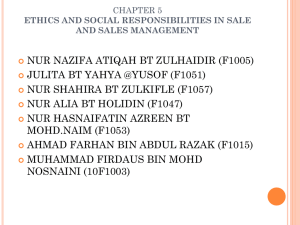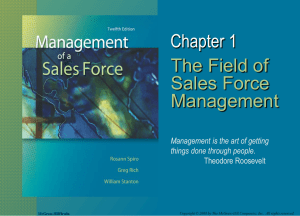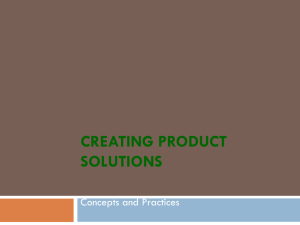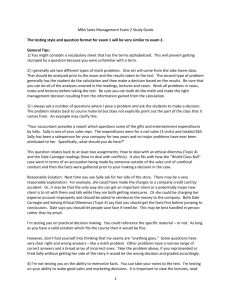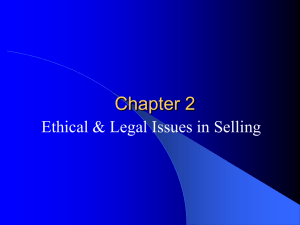Study Guide for Exam 1
advertisement
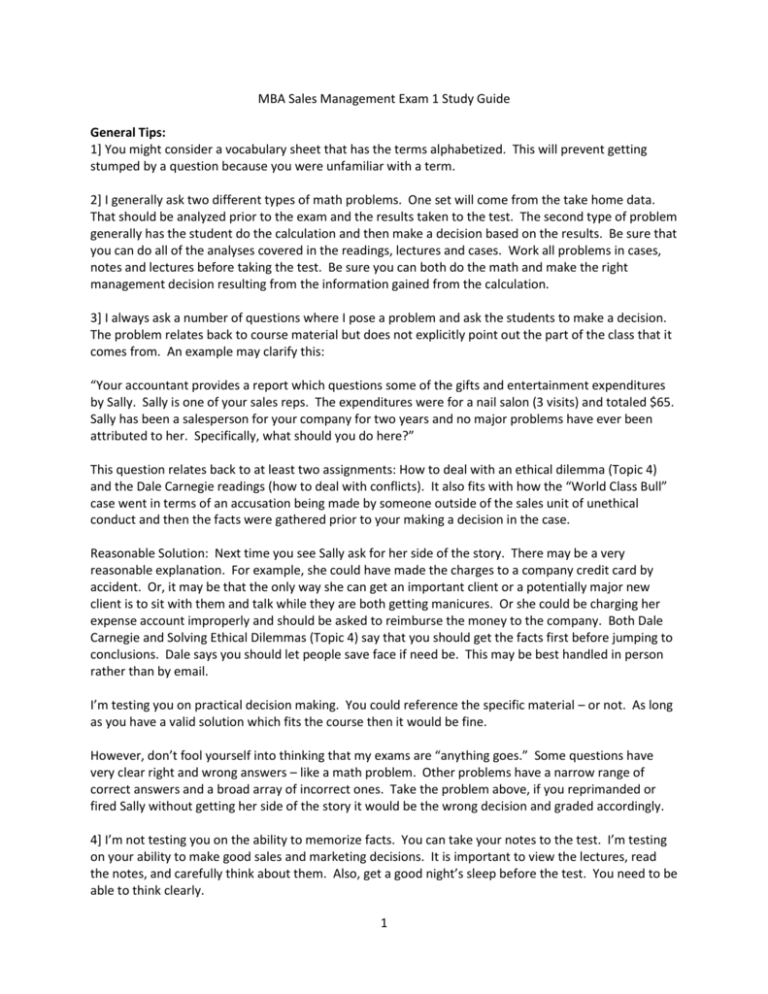
MBA Sales Management Exam 1 Study Guide General Tips: 1] You might consider a vocabulary sheet that has the terms alphabetized. This will prevent getting stumped by a question because you were unfamiliar with a term. 2] I generally ask two different types of math problems. One set will come from the take home data. That should be analyzed prior to the exam and the results taken to the test. The second type of problem generally has the student do the calculation and then make a decision based on the results. Be sure that you can do all of the analyses covered in the readings, lectures and cases. Work all problems in cases, notes and lectures before taking the test. Be sure you can both do the math and make the right management decision resulting from the information gained from the calculation. 3] I always ask a number of questions where I pose a problem and ask the students to make a decision. The problem relates back to course material but does not explicitly point out the part of the class that it comes from. An example may clarify this: “Your accountant provides a report which questions some of the gifts and entertainment expenditures by Sally. Sally is one of your sales reps. The expenditures were for a nail salon (3 visits) and totaled $65. Sally has been a salesperson for your company for two years and no major problems have ever been attributed to her. Specifically, what should you do here?” This question relates back to at least two assignments: How to deal with an ethical dilemma (Topic 4) and the Dale Carnegie readings (how to deal with conflicts). It also fits with how the “World Class Bull” case went in terms of an accusation being made by someone outside of the sales unit of unethical conduct and then the facts were gathered prior to your making a decision in the case. Reasonable Solution: Next time you see Sally ask for her side of the story. There may be a very reasonable explanation. For example, she could have made the charges to a company credit card by accident. Or, it may be that the only way she can get an important client or a potentially major new client is to sit with them and talk while they are both getting manicures. Or she could be charging her expense account improperly and should be asked to reimburse the money to the company. Both Dale Carnegie and Solving Ethical Dilemmas (Topic 4) say that you should get the facts first before jumping to conclusions. Dale says you should let people save face if need be. This may be best handled in person rather than by email. I’m testing you on practical decision making. You could reference the specific material – or not. As long as you have a valid solution which fits the course then it would be fine. However, don’t fool yourself into thinking that my exams are “anything goes.” Some questions have very clear right and wrong answers – like a math problem. Other problems have a narrow range of correct answers and a broad array of incorrect ones. Take the problem above, if you reprimanded or fired Sally without getting her side of the story it would be the wrong decision and graded accordingly. 4] I’m not testing you on the ability to memorize facts. You can take your notes to the test. I’m testing on your ability to make good sales and marketing decisions. It is important to view the lectures, read the notes, and carefully think about them. Also, get a good night’s sleep before the test. You need to be able to think clearly. 1 5] I would organize my notes carefully before starting the test. You have a limited time period and you need to be able to find the right section in your notes. Don’t burn up a bunch of time answering a couple of questions “perfectly” and forget about the time limit. When this happens you answer half the exam in 15 minutes – usually with poor results. 6] Read the question carefully. Be sure to answer all parts of a question. 7] Beware of trying to do a memory dump on everything you know about a topic instead of answering the question itself. Go back to the example in “3” above. You could start a big list of all of the points from the ethics lecture and/or Dale – and still not answer the question. 2 Topic 1: No material for exam. Topic 2: 1] Why is personal selling important? Why is sales management such a challenging job? 2] Why is managing salespeople more challenging than managing other employees? 3] How does a sales manager effectively “manage within the company?” 4] What is relationship selling? Is it always optimal? Which customers are likely to be selected for relationship selling? 5] What is the basic differences between inside and outside (field) selling? Topic 3: 1] What is situation analysis in a marketing strategy? 2] When you form a marketing strategy are you done? 3] How do you recognize when a marketing strategy should be changed? 4] How can you determine if a set of objectives is useful or not? You should also be able to determine if I gave a set of objectives if it they are generally useful or useless to running a sales force. 5] What is benchmarking? Is benchmarking always possible for a currently existing brand? What benchmarking targets are always possible? Occasionally possible? Topic 4: 1] How does ethics differ from the law? Can a company impose standards on employees that exceed the law? 2] What specific things can a sales manager/business owner do to reduce the chances of a lawsuit? 3] How should you respond to an ethical dilemma? (see practice question under General Tips #3). 4] Why are ethical leaders more important than ethical employees – or are they? 5] I discussed some issues that many consider legal problems – but are not. Briefly review those. 6] I discussed very specific means of avoiding legal problems in hiring & firing. You should be able to apply those. 7] I discussed very specific ways of using annual reviews to improve performance and avoid being sued. You should be able to apply this. 8] I discussed gifts and entertainment and how they apply legally. Be sure to differentiate between government employees and private sector people. 9] We discussed sexual harassment and how those issues can be avoided. 10] Be sure you understand what price fixing is and how you can avoid that. 11] Fraud, misrepresentation, and breach of contract are straight forward concepts that you should be able to apply to what is right and wrong in personal selling. We discussed this here and how it did not apply in the World Class Bull case. When answering test questions on legal issues students often over-think this. Most business law is very clear. My detailed discussions (sexual harassment, gifts, price fixing, hiring & firing, annual reviews) are in especially difficult to handle areas where I made some specific recommendations. If I give you a scenario that may have a legal/ethical dilemma be sure that you understand the facts first. Then consider if it is illegal or against company policy. Then make a rational decision in that context. It is 3 totally fair game for me to ask a question where there is no real ethical or moral issue. It is also fair for me to ask cash flow questions where the final business decision might not be legal. 4 Topic 5: World Class Bull Case 1] First, I will not ask you about any specific case facts in this or any other case. Do not try to memorize the case. Second, you should have read the case and followed the case discussion carefully. You are responsible for all of the issues in the case and should be able to address them if they come up in a different context. Here are a few examples of case issues we discussed: 2] How should confidential customer information be handled within a sales force? 3] How important are personal customer interests in most sales situations. (Answer: They usually are important on the margins but they will not make up for significant problems). See talk on “Why People Buy.” 4] When an ethical dilemma arises, how should it be handled? 5] If you are giving a customer a gift, how can you make it effective and stay within your budget? (This is a cross between Dale Carnegie & World Class Bull). 6] Should you have a contingency plan to deal with fallout from an inappropriate email sent to 10 employees? 7] How can you alter a star salesperson’s behavior without alienating them and driving them to a competitor? (also a cross between Dale Carnegie & World Class Bull). 8] As a sales manager, how should you handle conflict between one of your salespeople and some other manager within the company? Topic 6: 1] Should be able to calculate profit, unit contribution, and total contribution. 2] Should be able to calculate break-even. Remember, break-even in this class includes profit targets or past profit levels. Merely covering your costs is seldom good enough in business. 3] The Joe the Salesperson contribution problem gets into some of the specifics of figuring out contribution. They key is determining if the cash flow is relevant or not relevant to the decision at hand. As discussed in lecture, the best way to figure this out is if any future cash flows change if the activity is stopped or started. 4] Remember how to determine what sunk costs & relevant costs are and how they relate to contribution. 5] Understand and be able to apply the general concept of relative risk. 6] Profit Does Not Equal Cash. Be sure you understand this. 7] It is fair game to give you a balance sheet or a set of income statements and have you determine what is driving profits. It is also fair to take this for multiple years where you have to apply ratio analysis. This is a combination of what we covered in Topic 6 & the application in Green Acres Seed Co. Topic 7: 1] Budgets are not static. We discussed how a lot of sales budgets can be variable costs and if sales are much greater (or lower) than expected that the budgets must be revised within the period (year, quarter, month). 2] You should be able to apply and make decisions using % of sales budgeting. 3] You should understand the degree of budget flexibility that sales managers have when you: A] overspend budget caps and sales are within the target range B] overspend budget caps but your sales far exceeded forecasts (and you have positive unit contribution). 5 C] The flexibility sales managers have to transfer money between accounts while staying within their budget limits. 4] Should be able to do calculation of what you can afford to hire for salespeople & make rational decisions from the calculation. 5] Should be able to do the work load approach to set sales force size. Should also be able to understand trade-offs in service level and costs. 6] Should be able to logically apply the incremental strategy to hiring salespeople. 7] Should understand the cost/experience tradeoffs of hiring rookie & experienced salespeople. 8] Should be able to apply the simple turnover rate calculation. Should also be able to answer if turnover is always bad. 9] You should be able to make reasonable decisions on how to handle a planned downsizing so you maintain effectiveness of your staff. This was discussed at some length in lecture. Topic 8: Green Acres Seed Company This is a complex case with a lot of analysis. It provides specific applications of subjects in Topics 6 & 7. Again, I will not ask you about any specific case facts in this or any other case. Do not try to memorize the case. Second, you should have read the case and followed the case discussion carefully. You should also be able to replicate the analyses performed in this case with different data sets. You are responsible for all of the issues in the case and should be able to address them if they come up in a different context. 1] You should be able to do a ratio analysis and make reasonable decisions from this for profits going up or down. 2] If you have falling gross margins, you should be able to determine what the causes are. 3] This is an example of budgeting and the ability to transfer money between accounts versus going over budget caps. 4] This is also a practical discussion of the revenue forecast when you increase prices. 5] This is also a practical discussion of the problem of having your rewards (commissions) out of sync with your profitable cash flow. 6] This is also a good practical discussion of the interaction between sales performance and sales potential in assessing the individual effectiveness of salespeople. 7] I could draw a large number of sample problems from this with different companies, numbers, etc…. where the student would have to do the analyses and then arrive at a rational decision based on the analysis. This entire case revolves around this and applies issues from Topics 6 & 7. Topic 9: 1] Should understand and be able to determine what will (and won’t) work to successfully apply each of the three basic sales force strategies. 2] Should also be able to take a description of a sales situation and determine if the sales task is easy, hard, or very hard. 3] Relationship selling. Know what it is. More importantly, understand when companies would take that approach with a market segment and when they would not take that approach. 4] Should understand straight rebuy, modified rebuy and new purchase. More importantly, you should understand the selling situation when you are the in-supplier or out-supplier both in terms of future opportunities and how difficult the sales situation is. Again, I would probably provide an example situation and have you determine if it is was straight rebuy, modified rebuy or new purchase. Then 6 determine how difficult the sales situation is, or what your basic sales strategy should be if you are either the in-supplier or out-supplier. 5] Understand when a buying center becomes complex (ties into buying situation above). Understand how a salesperson succeeds when there are complex buying situations. Understand the basic roles and orientation of each of the different groups. This also ties in heavily to economic, technical or user buyer influences. Again, I would give you a situation and ask you what to do. You have to determine the type of selling situation, the motivations of the people involved, and usually choose a specific sales pitch to use to be effective from a range of specific sales options I would give you. 6] How do you build trust (or squander it)? 7] Annual assessment of key (not all) customers. What is it? Why is it not done for all customers? Topic 9: Rick Fire Case Again, I will not ask you about any specific case facts in this or any other case. Do not try to memorize the case. Second, you should have read the case and followed the case discussion carefully. You are responsible for all of the issues in the case and should be able to address them if they come up in a different context. 1] This case provides some wonderful examples of how sales force organization can cause big problems. 2] It provides some wonderful examples of the risks associated with going over the head of your boss. 3] It also provides a good example of how lack of preparation can kill a sales presentation. 4] Provides a good example of how team selling can cause major problems. 5] It is also a very good example of how difficult it is to close a deal for a new product, and how difficult it is to recover in situations where this blows up. As always with the cases, you should be able to specifically handle similar situations/problems as discussed in this case. The case itself provides applications on a number of sales management issues. Topic 10: 1] Should understand what quotas, compensation, and company policy are and how they interact. 2] Should be able to tell if a set of goals or quotas works well or does not work well in a situation. One application of this was in Green Acres where the commission conflicted with the unit contributions which conflicted with the difficulty of the selling situation. 3] Should understand what sales quotas, financial quotas, and activity quotas are. Should be able to understand which types are used frequently, infrequently, and how they are used in training versus with experienced salespeople. 4] Should be able to do the math and make a reasonable decision on the impact of price setting on sales commissions and gross margin commissions. Topic 11: 1] Should be able to understand what prime selling time is and how salespeople should manage it. 2] Should understand how managers can help (or kill) time management. 3] Should be able to understand how managers should use micro-management effectively, or not with experienced salespeople, rookies, and successful/unsuccessful salespeople. 4] Cost Per Call – If I have this calculation it will be on a take home data set. 5] Single Factor Model – This calculation would be on a take home data set. 7 6] Should understand how to allocate sales calls using contribution per call (cost & revenue) in a take home data set. 7] Should be able to calculate contribution for a sales account and make a reasonable decision on dropping it or not (detailed example in notes). 8] Prospecting Model – this is counter-intuitive. Be sure to examine this carefully because it is one of the few things in the class where the optimal practice is not just applied common sense. 9] There was a discussion in lecture and on the last page of the notes which highlights that large accounts in terms of revenues may, or may not be the most profitable. There is another discussion of the impact of price discounting on profits (similar to Green Acres example and example from Topic 10 power point). 10] Should understand the general concept of a minimum account size. There are some accounts that your field sales force is just too costly to use. A final point. I typically give data and require analysis and a logical decision from the analysis for a group of questions. The other type of questions that I use a lot is giving you a situation and ask you to make a decision. I seldom ask “give me the facts” or “give me a detailed description of a management process” questions. The focus of the course is on applications and the exams will continue this focus. You have to learn the concepts and facts before you can successfully apply them. You can have the facts at your fingers. Be sure you understand how to make good sales management decisions from the situation. Keep in mind the general tips I gave on pages 1-2. Throughout this study guide I pointed out where specific cases required making decisions relating back to specific class topics. Giving a much, much shorter situation and having you make a decision is my common testing style. 8
